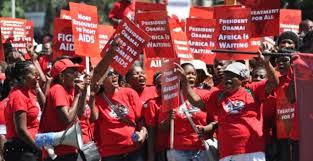By Larissa Klazinga – South Africa

2016 marks the return of the International AIDS Conference to Africa, 16 years and millions of deaths after Nkosi Johnson addressed world leaders, and international activists on the realities of AIDS in Africa.
Nkosi Johnson lost his battle against HIV later that same year as South Africa struggled to survive Mbeki’s AIDS denialism and Manto’s beetroot and garlic pseudo-science. Today HIV need not a death sentence for South Africans, with over 3 million people accessing lifesaving antiretroviral medication at government clinics. In the course of his tenure, Health Minister Motsoaledi has spearheaded the largest public health revolution in recent times and South Africa has gone from global pariah to world leaders on HIV.
South African is one of only a handful of countries with a government committed to public health and a national budget that allows us to continue expanding access to treatment while shouldering the financial burden ourselves. South Africa contributes over 80% of the cost of treatment, making us a leader on the continent in HIV/AIDS response.
While South Africa has made great progress in the fight against HIV/AIDS, the same cannot be said for its neighbours; Lesotho and Swaziland. With HIV prevalence rates of 23% and 29% respectively, our land-locked neighbours are still grappling with the epidemic. Worse still, ongoing global funding cuts threaten to jeopardise the progress made to date and could fuel the rise of new infections and AIDS-related deaths.
As far back as 2010, the Global Fund has failed to meet its funding targets and this funding scale-back is a major cause for concern when viewed in the context of countries like Lesotho and Swaziland. As the Global Fund enters a new replenishment cycle, key European contributors are reducing their contributions to the Fund and redirecting resources to assist with the influx of refugees into Europe.
Exacerbating the funding crisis, a country like China which has multi-billion dollar stakes in Africa continues to profit from Africa’s growth, but refuses to live up to their responsibilities to contribute to the Global Fund; donating only a fraction of the billion dollars they owe. China, perhaps more than any other foreign investor, has benefitted from Africa’s preferential trade agreements and open markets but refuses to pay their fair share towards maintaining the health of the nations they exploit for raw materials and cheap labour.
In addition, and against all logic, the World Bank has reclassified both Swaziland and Lesotho as Middle-Income Countries (MIC), making them “ineligible” for the level of funding they need to turn the tide on AIDS. This is because countries classified as MIC qualify for less funding from the Global Fund, but must pay twice as much for essential medicines. The new classification is based on the mean GDP amount of UD$2.87 per person per day, or roughly the cost of a cup of coffee at Rosebank’s newly opened Starbucks.

The impact of the MIC reclassification combined with the Global Fund replenishment shortfall cannot be overstated; with drug stock-outs, test kit shortages and condom supply shortfalls, countries like Lesotho and Swaziland are facing an uphill battle to save their citizens from needless, agonising deaths.
South Africans have seen the consequences of being denied access to life-saving medication first-hand. As a result, we have a responsibility to speak out on behalf of our neighbours and to hold our trade partners accountable to pay their fair share. On the 16th of July, the eve of the 2016 International AIDS Conference, activists from around the world will gather in downtown Durban to call on world leaders to Keep the Promise to fund HIV interventions. We invite all people of conscience to join that call.
Photo credit : AIDS Healthcare Foundation (AHF)